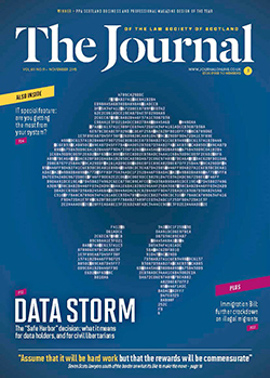President's column

Remembering Mrs Donoghue
I was at the opening of the legal year in England & Wales last month. It was a wonderful day, starting with a ceremony in Westminster Abbey. But the best bit for me was rather unexpected. The Reverend Robin Griffith-Jones delivered a warm and thoughtful sermon, and chose to begin by talking about what is, perhaps, one of the Scottish legal system’s best known and loved exports into common law legal systems, the famous case of the snail in the ginger beer bottle – Donoghue v Stevenson.
One fundamental right which Scotland acknowledged from the earliest times was the right to counsel regardless of financial means. Lord Bingham, in his classic text The Rule of Law, acknowledged the role of Scotland in promoting legal assistance when he wrote: “the Scots recognised this problem as long ago as 1424 when, in the world’s first statutory authority on legal aid for the poor, it was enacted that, ‘if there be any poor creature for default of cunning or means that cannot or may not follow his cause’, free legal assistance should be given to him”.
This basis of the poor law had remarkable results when, in 1932, May Donoghue won her case against Stevenson the ginger beer manufacturer, in the House of Lords. That case, which ruled that a manufacturer had a duty of care to an ultimate consumer, went on to become the legal basis of much consumer protection law throughout the common law world. Mrs Donoghue could only afford to take her case because of the poor law. That, ladies and gentlemen, is something all Scots should be proud of and something I encourage the Scottish Government to reflect on at the opening of our own legal year.
Access to justice is an essential element of a fair and democratic society and an indicator of the rule of law. The legal profession provides advice and assistance to guide individuals through some of the most important events in their lives. Access to quality legal advice and representation for everyone, regardless of means, helps tackle inequality, encourages early resolution of problems, and protects fundamental rights. Continued investment in our legal aid system is essential to ensure that the citizens of Scotland have access to justice and that those that provide legal advice and assistance are fairly remunerated.
Back to the future
Continuing that theme, the Sheriff Appeal Court has begun to sit in Edinburgh. A united, strong response from the Society and profession to the Justice Committee resulted in interim legal aid regulations that ensure that the public can continue to access legal support for summary appeal cases. However, the legal aid rates available for solicitors to conduct this type of work were fixed in 1992 and have been frozen for almost a quarter of century while the costs of running a practice continue to rise. The Scottish Government is committed to reviewing these arrangements within six months. We will participate fully in the review process, continuing to engage with all members to represent your views. Non-legal aid lawyers have an interest in this too, of course. A fair and just society, upholding the rule of law, is of interest to us all. Let’s not forget that in England & Wales the Lord Chancellor recently suggested that large law firms should be taxed to fund legal aid, and compulsory pro bono is a subject of much debate.
Sticking with the future, I have been speaking a lot recently about the need for solicitors to be innovative to meet changing client expectations, often driven by the use of technology. And who better to speak to about those changing expectations than those who have grown up with the internet, online services and social media? At a lively meeting of sole practitioners from Glasgow and Edinburgh last week we had a panel session on investing in a trainee, followed by a fun “speed dating” event with a group of Diploma graduates. The feedback has been amazingly positive, with much knowledge and experience shared. Even better, a little bird tells me that at least one of those graduates has since received a traineeship offer. I have to confess, I was sceptical about the idea at first, but the proof of the pudding is in the eating. It was a very successful evening, and food for thought!
In this issue
- Appropriate adults and defence agents: who does what?
- Buying from a housing association: why consent matters
- Harassment: a civil claim?
- A welcome abroad: EYBA in London
- Reading for pleasure
- Opinion: David Faith
- Book reviews
- Profile
- President's column
- ScotLIS gets the green light
- People on the move
- Storm over Safe Harbor
- Light on a murky world
- Southern horizons
- Mediation minefield
- Migrants: no way to turn?
- The technological edge
- As our suppliers see us
- More rules to grapple with
- Fraud and divorce – a Scottish Sharland?
- What future for employment tribunal fees?
- Heading for a showdown on hard won human rights?
- Taxing question of relief
- Scottish Solicitors Discipline Tribunal
- How far can we rely on the register?
- All part of the game
- Law reform roundup
- From the Brussels office
- Poverty: a new front in the war
- Damage limitation: working it out
- Ask Ash
- A lawyer's lament
- Appreciation: Michael Scanlan






